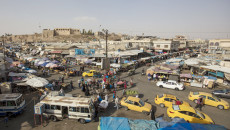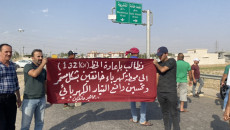Kirkuk Health director, Nabil Hamdi Boshnaq, stated that power outage in Kirkuk is affecting storage process of Coronavirus vaccines, however he stressed that "no vaccine doses have lost potency."
Boshnaq's statements to (KirkukNow) came amid widespread power outage in Iraq, besides a hike in fuel prices which is preventing private power generators from meeting public demand on electricity.
“Power cuts have become a problem facing our directorate for days, as we failed to find an appropriate means to store and preserve Coronavirus vaccines,” according to Boshhnaq.
Three types of Coronavirus vaccines are currently available in Kirkuk, including Pfizer, AstraZeneca and Sinopharm.
The Pfizer vaccine needs to be stored at temperatures ranging from -60 to -80 degrees centigrade, while the doses of AstraZeneca and Sinopharm vaccines are kept at temperatures ranging between -2 to -8 degrees centigrade, which means they can be stored in regular refrigerators.
"So far, no vaccine doses have been affected," according to Boshnaq, who added, "we are asking the directorate of Oil Products Distribution to increase our share of fuel and reduce its price so that we can operate the generators in case we encounter a national power outage."
Prior to the major blackout on Thursday, July 1st, Kirkuk northern province was supplied with 16 hours of national electricity a day, and the rest was filled up by private power generators.
"The power crisis coincides with a rise in fuel prices, as the price of a litre of diesel has reached 576 dinars (38 cents)," Kirkuk health director said.
"All types of vaccines should be kept inside refrigeration systems on a continuous basis."
Iraq's electricity ministry has cited a number of causes for the prolonged and widespread cuts including terrorist attacks on electricity lines, shortages of fuel for power stations, and the suspension of energy supplies from neighbouring Iran.
Total shutdowns such as last Friday's can also occur when the electricity network is working at maximum capacity. Defects in the transmission network and distribution capacity also contribute to outages. High temperatures can also impact the distribution lines.
Iraqi Prime Minister Mustafa al-Kadhimi formed a crisis cell to take immediate measures to address shortages, according to a statement from his media office.
The Iraqi ministry of electricity follows the standard structure of power generation, transmission then distribution, where every stage of the delivery process is also segmented into regions, each region has a separate company. Iraq is divided into four regions: the south, the middle and upper Euphrates or midlands, Baghdad, and the north.
In 2019, Iraq's gas and thermal power plants generated only 70% of the demand for electricity, local and international studies have shown. Besides, Iraq imports 1200 MW through four lines from its neighbor Iran, 300-400 from Turkey and 200 Mw from Jordan.







